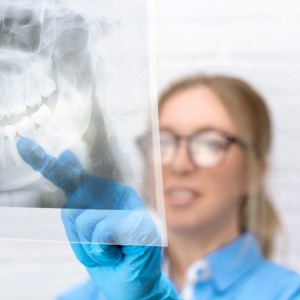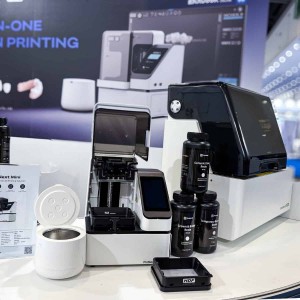
Non-Opioid Pain Relievers Beat Opioids After Dental Surgery
A combination of acetaminophen (Tylenol) and ibuprofen (Advil, Motrin) controls pain after wisdom tooth removal better than opioids, according to a Rutgers Health study that could change how dentists treat post-surgical pain.
The trial in more than 1,800 patients found that those given a combination of ibuprofen and acetaminophen experienced less pain, better sleep and higher satisfaction compared with those receiving the opioid hydrocodone with acetaminophen.
“We think this is a landmark study,” said Cecile Feldman, dean of Rutgers School of Dental Medicine and lead author of the study funded by the National Institutes of Health’s National Institute of Dental and Craniofacial Research. “The results actually came in even stronger than we thought they would.”
Dentists, who rank among the nation’s leading prescribers of opioids, wrote more than 8.9 million opioid prescriptions in 2022. For many young adults, dental procedures such as wisdom tooth extraction are their first exposure to opioid medications.
“There are studies out there to show that when young people get introduced to opioids, there's an increased likelihood that they're going to eventually use them again, and then it can lead to addiction,” said study co-investigator Janine Fredericks-Younger, adding that opioid overdoses kill more than 80,000 Americans each year.
To compare opioid and non-opioid pain relief, the researchers conducted a randomized trial on patients undergoing surgical removal of impacted wisdom teeth, a common procedure that typically causes moderate to severe pain.
Half the patients received hydrocodone with acetaminophen. The other half got a combination of acetaminophen and ibuprofen. Patients rated their pain levels and other outcomes, such as sleep quality, over the week following surgery.
Results in The Journal of American Dental Association showed the non-opioid combination provided superior pain relief during the peak-pain period in the two days after surgery. Patients taking the non-opioid medications also reported better sleep quality on the first night and less interference with daily activities throughout recovery.
Patients who received the over-the-counter combo were only half as likely as the opioid patients to require additional "rescue" pain medication. They also reported higher overall satisfaction with their pain treatment.
“We feel pretty confident in saying that opioids should not be prescribed routinely and that if dentists prescribe the non-opioid combination, their patients are going to be a lot better off,” Feldman said.
The study's size and design make it particularly notable. With more than 1,800 participants across five clinical sites, it's one of the largest studies of its kind. It also aimed to reflect real-world medication use rather than the tightly controlled conditions of many smaller pain studies.
“We were looking at the effectiveness – so how does it work in real life, taking into account what people really care about,” said Feldman, referring to the study’s focus on sleep quality and the ability to return to work.
The findings align with recent recommendations from the American Dental Association to avoid opioids as first-line pain treatment. Feldman said she hopes they will change prescribing practices.
“For a while, we've been talking about not needing to prescribe opioids,” Feldman said. “This study’s results are such that there is no reason to be prescribing opioids unless you've got those special situations, like medical conditions preventing the use of ibuprofen or acetaminophen.”
Members of the research team said they hope to expand their work to other dental procedures and pain scenarios. Other researchers at the school are testing cannabinoids for managing dental pain.
“These studies not only guide us on how to improve current dental care,” said Feldman, “but also on how we can better train future dentists here at Rutgers, where we constantly refine our curriculum the light of science.”
Author: Andrew Smith
Source: https://www.rutgers.edu/
 Related articles
Related articles
Restorative dentistry 28 February 2023
What is the most effective drug treatment to control tooth extraction pain?
A recent study published in the Journal of Dental Research compared the effectiveness of 10 pharmacological interventions in developing guidelines for the management of acute pain after tooth...
Webinar 22 September 2021
New CE webinar from ADA: Opioids, Dentistry, and Addiction: The Dentist’s Role in Treating Pain
Two past presidents of the Ohio Dental Association are leading a free webinar that features the positive role dentists can play to help mitigate the opioid crisis and discuss the relationship between...
Products 10 July 2024
Vivek Anil Chitte, DMD, Recognized for Exceptional Contributions to Dental Surgery
Prominently featured in The Inner Circle, Vivek Anil Chitte, DMD, is acknowledged as a Pinnacle Lifetime Member for his contributions to elevating dental surgery.
Specialist business property adviser, Christie & Co, has announced the sale of J Hibbert Dental Surgery in Crewe, Cheshire.
News 24 October 2023
Student Profile: Oluwatobi Dauda, Class of 2024 – How dental surgery led to dental school
This profile is one in an ongoing series highlighting School of Dentistry alumni, donors and students.
 Read more
Read more
Digital Dentistry 30 January 2026
Digital dentistry may be defined in a broad scope as any dental technology or device that incorporates digital or computer-controlled components in contrast to that of mechanical or electrical alone.
Editorials 30 January 2026
Faculty Member’s Research Advances Link Between Gum Disease and Rheumatoid Arthritis
A University of Michigan School of Dentistry faculty member is part of a new study that advances understanding of the links between gum disease and rheumatoid arthritis.
Products 30 January 2026
PioCreat is exhibiting at AEEDC Dubai 2026, the world’s leading dental conference and exhibition, currently taking place from January 19–21, 2026, at the Dubai World Trade Centre.
News 30 January 2026
MB2 Dental, the nation’s first and largest dental partnership organization (DPO), closed out 2025 with notable achievements in growth, innovation, and impactful initiatives.
News 30 January 2026
uLab Systems recently announced the release of uDesign® Cloud 2.0, a major platform update that brings core clear aligner workflows—including segmentation, self-planning, and printing or exporting...















